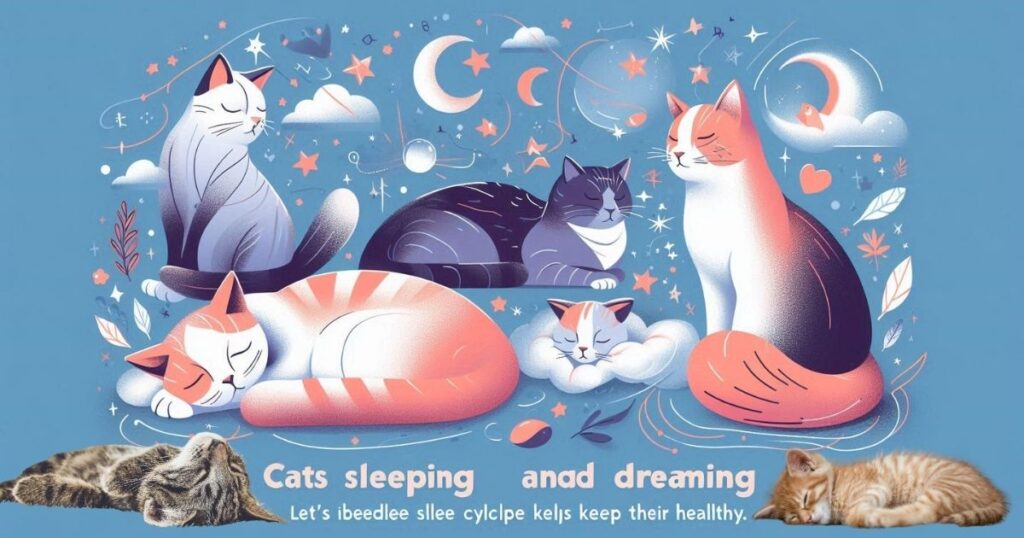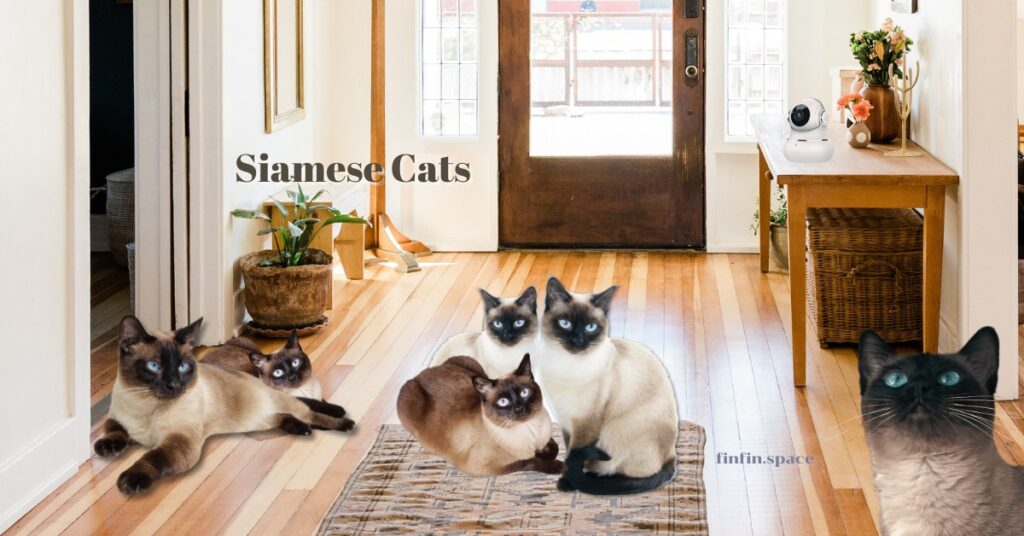Cats Sleep cats the enigmatic companions that walk our homes with an air of mystery and independence, are subjects of endless fascination. Among the many curiosities they present, their sleep patterns and the possibility of dreaming have intrigued cat owners and animal researchers alike. This article delves deep into the world of cats, unraveling the secrets behind their slumber and the dreams that may occur within.
Contents
The Sleeping Habits of Cats
Cats are known for their ability to sleep anywhere, anytime. But this isn’t mere laziness; it’s an evolutionary trait that conserves energy for hunting. Domestic cats, though not required to hunt, still retain this instinct, leading them to sleep an average of 12 to 16 hours a day.
Understanding Cat Slumber Cycles
Cat sleep is divided into two main stages: the light sleep phase and the rapid eye movement (REM) phase. The light sleep phase allows them to rest while staying alert to their surroundings, a survival trait from their wild ancestors. The REM phase, however, is where the magic of dreaming happens.
Do Cats Dream?
Yes, cats do dream. Similar to humans, when cats enter the REM phase of sleep, their brain activity spikes, suggesting the occurrence of dreams. This phase is often accompanied by twitching whiskers, paws, and even soft meowing, hinting at the vivid dreams unfolding in their minds.

The Science Behind Cat Dreams
Research indicates that the hippocampus, the part of the brain associated with memory and learning, is active during the REM sleep of cats. This activity suggests that cats could be processing the day’s events, possibly reliving their moments of exploration and play in their dreams.
How to Tell if Your Cat is Dreaming
Observing your cat during sleep can offer clues to their dream state. Twitching movements, rapid eye movement under the eyelids, and varying breathing patterns are tell-tale signs that your cat has entered the dream phase of their sleep cycle.
The Role of REM Sleep in Cats
REM sleep is crucial for cognitive processes, allowing cats to process information and solidify memories. This sleep stage is essential for their learning and emotional health, providing a restorative function beyond mere physical rest.
Cat slumber What Do Cats Dream About?
While we can’t ask them, it’s believed that cats dream about their daily activities. This could range from chasing birds to playing with their favorite toys, or even interactions with their human companions.
The Importance of Sleep for Cats
Sleep is not just a time of rest for cats; it’s a critical component of their overall health. Adequate sleep supports immune function, growth, and repair processes, making it essential for a happy, healthy cat.
How to Support Your Cat’s Sleep and Dreaming
Creating a comfortable, safe sleeping environment is key. Ensure your cat has a quiet, cozy spot to doze off, away from the hustle and bustle of the household.
Common Sleep Disorders in Cats
Like humans, cats can suffer from sleep disorders, including insomnia, sleep apnea, and narcolepsy. Recognizing the signs and seeking veterinary advice is important for the well-being of your feline friend.

Diagnosing and Treating Cat Sleep Disorders
Veterinarians can offer guidance on managing sleep disorders, ensuring your cat returns to a healthy sleep pattern. Treatments may include environmental changes, medication, or dietary adjustments.
Tips for a Better Cat slumber
Establishing a routine, providing ample playtime, and maintaining a calm environment can greatly improve your cat’s sleep quality. Remember, a well-rested cat is a happy cat.
Conclusion
Understanding the intricacies of cat sleep and dreams opens a window into the fascinating world of our feline companions. By observing and learning about their sleep patterns, we not only ensure their health and well-being but also deepen the bond we share with them. Cats, much like humans, require quality sleep for their physical and mental health. Their unique sleep cycles and the possibility of dreaming add another layer to the complex beings they are. As cat owners and animal lovers, recognizing and respecting their sleep needs is a critical aspect of caring for them. Let’s cherish these insights, as they guide us to provide a nurturing environment for our beloved pets, ensuring they live happy, healthy lives filled with peaceful slumbers and perhaps even adventurous dreams.

FAQs
- Q: How many hours a day do cats typically sleep?
- A: Cats can sleep anywhere from 12 to 16 hours a day, with some cats, especially older ones, sleeping up to 20 hours in 24 hours.
- Q: Can cats have nightmares?
- A: While there’s no way to confirm what cats are dreaming about, behavioral signs like twitching, growling, or rapid movements during sleep suggest they could experience dreams and possibly nightmares.
- Q: How can I tell if my cat is dreaming?
- A: Cats in the REM stage of sleep may exhibit signs of dreaming, such as slight ear twitches, paw movements, whisker twitches, and even soft vocalizations.
- Q: Is it normal for my cat to sleep all day?
- A: Yes, it’s normal for cats to sleep a lot. Their sleep patterns are influenced by their natural instincts, with periods of rest interspersed with bursts of activity, especially at dawn and dusk.
- Q: Should I wake my cat if it seems to be having a nightmare?
- A: It’s usually best not to wake a cat experiencing a dream, even if it seems like a nightmare. Disturbing their sleep can be startling and disorienting. Instead, provide a calm, safe sleeping environment to encourage peaceful rest.
- Q: How can I improve my cat’s sleep quality?
- A: Ensure your cat has a comfortable, quiet place to sleep away from high traffic areas. Keep a consistent routine, offer ample playtime, and consider a vet visit if your cat’s sleep patterns change suddenly, as it could indicate a health issue.
- Q: Do older cats sleep more than younger ones?
- A: Yes, senior cats tend to sleep more than their younger counterparts. This increase in sleep is partly due to their lower energy levels and possibly due to health-related issues.
By addressing these common questions, we aim to enhance your understanding and ability to care for your cat, ensuring they enjoy the restful and rejuvenating sleep they deserve.




